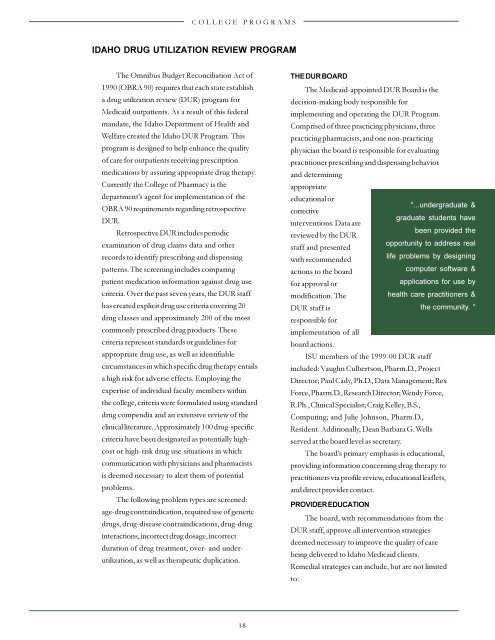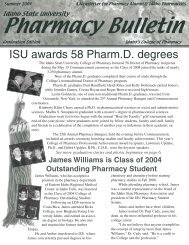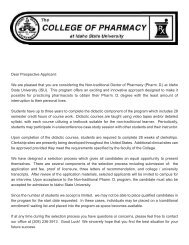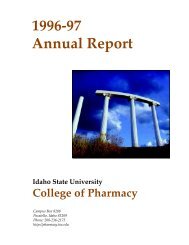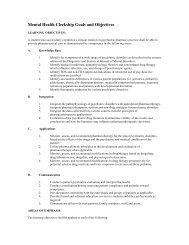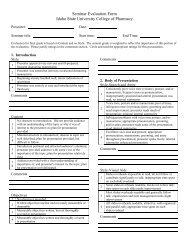ARtrial 2 - College of Pharmacy - Idaho State University
ARtrial 2 - College of Pharmacy - Idaho State University
ARtrial 2 - College of Pharmacy - Idaho State University
Create successful ePaper yourself
Turn your PDF publications into a flip-book with our unique Google optimized e-Paper software.
C O L L E G E P R O G R A M S<br />
IDAHO DRUG UTILIZATION REVIEW PROGRAM<br />
The Omnibus Budget Reconciliation Act <strong>of</strong><br />
1990 (OBRA 90) requires that each state establish<br />
a drug utilization review (DUR) program for<br />
Medicaid outpatients. As a result <strong>of</strong> this federal<br />
mandate, the <strong>Idaho</strong> Department <strong>of</strong> Health and<br />
Welfare created the <strong>Idaho</strong> DUR Program. This<br />
program is designed to help enhance the quality<br />
<strong>of</strong> care for outpatients receiving prescription<br />
medications by assuring appropriate drug therapy.<br />
Currently the <strong>College</strong> <strong>of</strong> <strong>Pharmacy</strong> is the<br />
department’s agent for implementation <strong>of</strong> the<br />
OBRA 90 requirements regarding retrospective<br />
DUR.<br />
Retrospective DUR includes periodic<br />
examination <strong>of</strong> drug claims data and other<br />
records to identify prescribing and dispensing<br />
patterns. The screening includes comparing<br />
patient medication information against drug use<br />
criteria. Over the past seven years, the DUR staff<br />
has created explicit drug use criteria covering 20<br />
drug classes and approximately 200 <strong>of</strong> the most<br />
commonly prescribed drug products. These<br />
criteria represent standards or guidelines for<br />
appropriate drug use, as well as identifiable<br />
circumstances in which specific drug therapy entails<br />
a high risk for adverse effects. Employing the<br />
expertise <strong>of</strong> individual faculty members within<br />
the college, criteria were formulated using standard<br />
drug compendia and an extensive review <strong>of</strong> the<br />
clinical literature. Approximately 100 drug-specific<br />
criteria have been designated as potentially highcost<br />
or high-risk drug use situations in which<br />
communication with physicians and pharmacists<br />
is deemed necessary to alert them <strong>of</strong> potential<br />
problems.<br />
The following problem types are screened:<br />
age-drug contraindication, required use <strong>of</strong> generic<br />
drugs, drug-disease contraindications, drug-drug<br />
interactions, incorrect drug dosage, incorrect<br />
duration <strong>of</strong> drug treatment, over- and underutilization,<br />
as well as therapeutic duplication.<br />
THE DUR BOARD<br />
The Medicaid-appointed DUR Board is the<br />
decision-making body responsible for<br />
implementing and operating the DUR Program.<br />
Comprised <strong>of</strong> three practicing physicians, three<br />
practicing pharmacists, and one non-practicing<br />
physician the board is responsible for evaluating<br />
practitioner prescribing and dispensing behavior<br />
and determining<br />
appropriate<br />
educational or<br />
"...undergraduate &<br />
corrective<br />
graduate students have<br />
interventions. Data are<br />
been provided the<br />
reviewed by the DUR<br />
opportunity to address real<br />
staff and presented<br />
with recommended<br />
life problems by designing<br />
actions to the board<br />
computer s<strong>of</strong>tware &<br />
for approval or<br />
applications for use by<br />
modification. The<br />
health care practitioners &<br />
DUR staff is<br />
the community. "<br />
responsible for<br />
implementation <strong>of</strong> all<br />
board actions.<br />
ISU members <strong>of</strong> the 1999-00 DUR staff<br />
included: Vaughn Culbertson, Pharm.D., Project<br />
Director; Paul Cady, Ph.D., Data Management; Rex<br />
Force, Pharm.D., Research Director; Wendy Force,<br />
R.Ph., Clinical Specialist; Craig Kelley, B.S.,<br />
Computing; and Julie Johnson, Pharm.D.,<br />
Resident. Additionally, Dean Barbara G. Wells<br />
served at the board level as secretary.<br />
The board’s primary emphasis is educational,<br />
providing information concerning drug therapy to<br />
practitioners via pr<strong>of</strong>ile review, educational leaflets,<br />
and direct provider contact.<br />
PROVIDER EDUCATION<br />
The board, with recommendations from the<br />
DUR staff, approve all intervention strategies<br />
deemed necessary to improve the quality <strong>of</strong> care<br />
being delivered to <strong>Idaho</strong> Medicaid clients.<br />
Remedial strategies can include, but are not limited<br />
to:<br />
18


